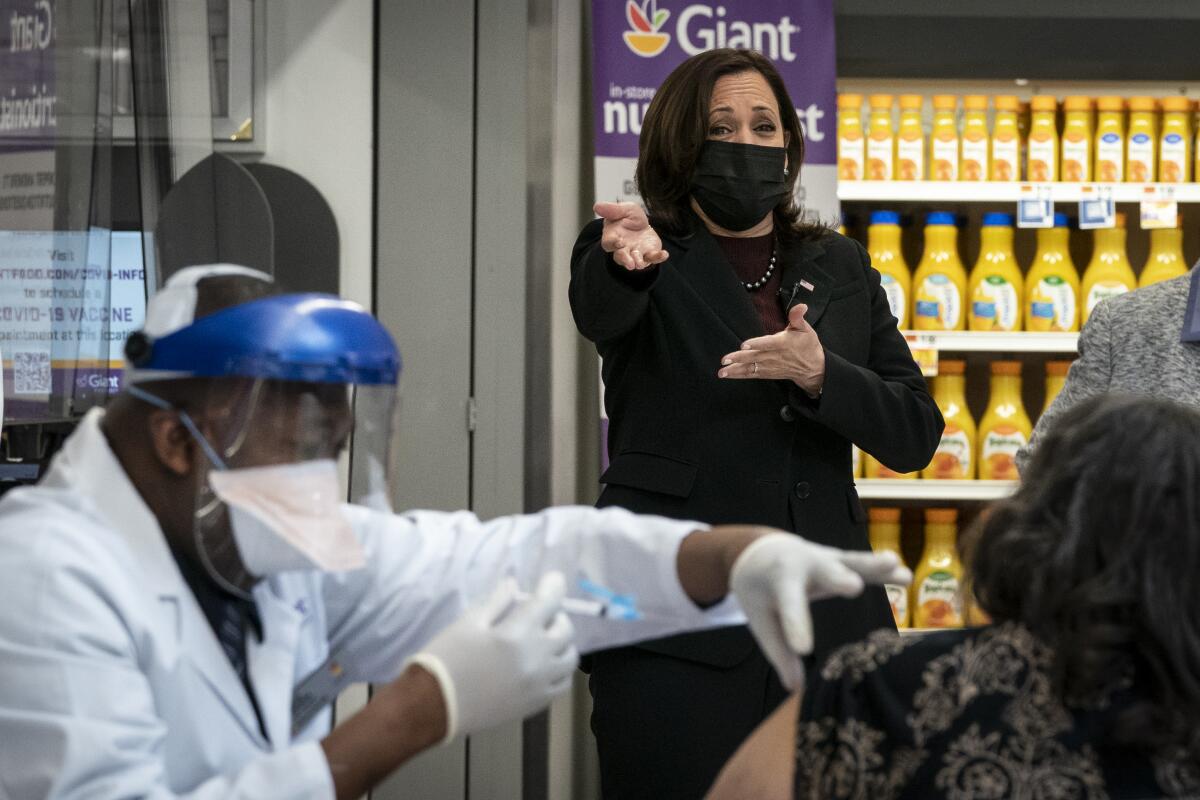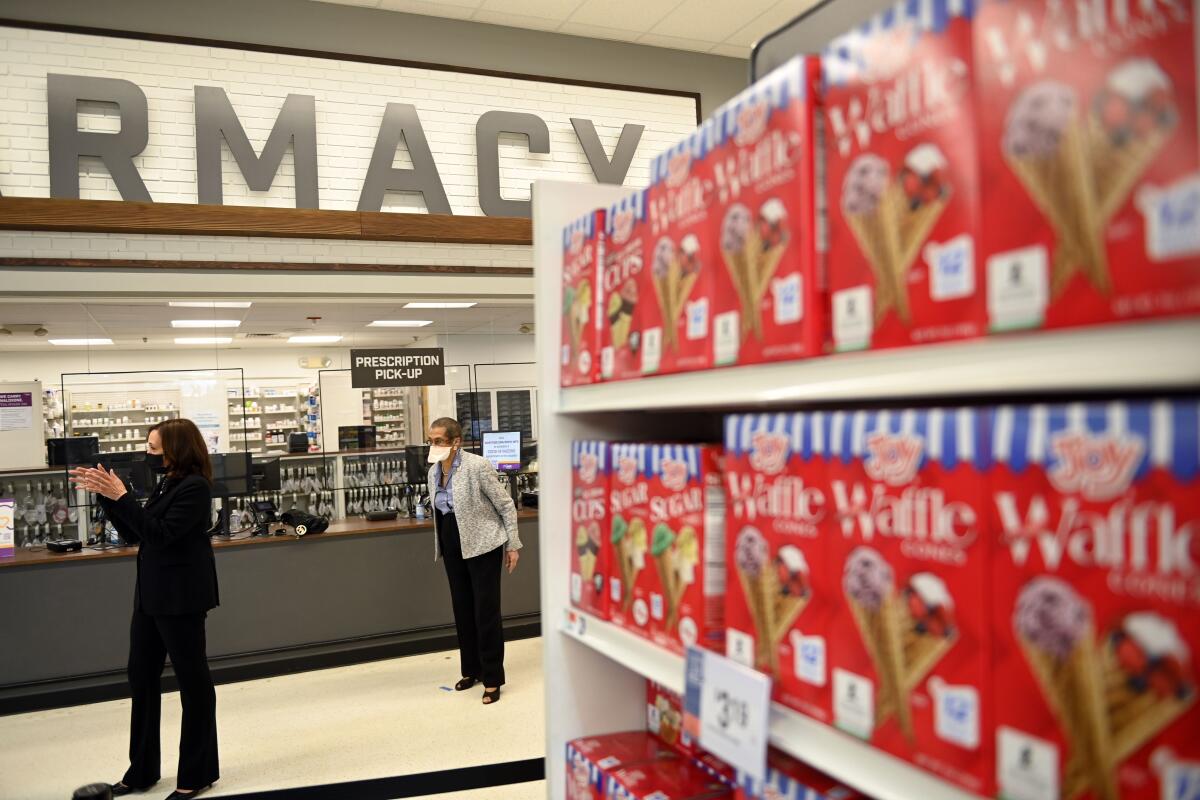Essential Politics: Kamala Harris enters a supermarket — and a security bubble

- Share via
This is the March 3, 2021, edition of the Essential Politics newsletter. Like what you’re reading? Sign up to get it in your inbox three times a week.
In the early 2000s, a friend in Florida shared a wild story about a night she spent in a closed Publix supermarket, where she joined a volunteer cast of “shoppers” so that Michael Jackson could spend his birthday filling his grocery cart like a regular person.
I thought about my friend’s surreal encounter last week when I passed through a temporary metal detector in a Washington, D.C., grocery store, shortly before a visit by Vice President Kamala Harris. The collection of Secret Service agents, police officers and Giant supermarket managers wandering the aisles amid a handful of actual shoppers was a vivid reminder that Harris now lives in a bubble that few of us experience.
Good morning and welcome to the Essential Politics Newsletter — the Kamala Harris edition. This week, I thought I would offer a backstage glimpse into how strange even the most mundane places can feel when a president or vice president shows up.
Get our L.A. Times Politics newsletter
The latest news, analysis and insights from our politics team.
You may occasionally receive promotional content from the Los Angeles Times.
Supermarket sweep
Harris came to the Giant in southeast Washington to highlight a Biden administration program intended to help older people get COVID-19 vaccines in one of 7,000 pharmacies nationwide. I wrote about the visit as part of a story on her role in persuading Black Americans, who have withstood a history of unequal treatment by doctors and researchers, to take the vaccine.
Those of us in the pool of about a dozen journalists who covered the event needed to get tested for COVID-19 at the White House and then drive across town to the supermarket by 7:30 a.m., about 90 minutes before Harris arrived.
About half of the parking lot was blocked off by security. But regular shoppers were allowed in, once they passed through the metal detector.

Before Harris arrived, reporters and photographers were held in a staff break room on the second floor. Our laptops and cameras were inspected. We could leave for a bathroom break, with the permission of our Secret Service agent.
From our perch, we could see what amounted to a Potemkin supermarket, where shoppers were greatly outnumbered by security and supermarket staff. The shelves were better stocked than any I’ve seen.
After we came downstairs and Harris arrived, she stood in a corner by the pharmacy — between bags of quinoa and cases of frozen pizzas and orange juice — to speak with pharmacists and a 69-year-old woman who was getting her second vaccine shot. Harris also addressed workers, thanking them for their work during the pandemic. After less than a half-hour, she left in a limousine parked near a store exit, near a display of half-priced TastyKakes.
This type of preparation, security and theater is not new or unusual for a president or vice president. I spent four years following former President Trump and former Vice President Mike Pence to factory floors, a football game and a summit with Kim Jong Un, among other places. The procedures were similar.
Enjoying this newsletter? Consider subscribing to the Los Angeles Times
Your support helps us deliver the news that matters most. Become a subscriber.
Don’t forget the price of the subway card
Trump rarely went to restaurants or any commercial properties that he did not own. The closest thing to a supermarket that I visited with him was a Mormon food pantry in Utah that was closed to the public during his visit. Our tour there was brief and Trump didn’t look interested, though he did ask some questions.
Harris and President Biden have shown that they plan to get out and about a bit more, though COVID-19 restrictions limit dining at restaurants, as the Obamas were known to do. Biden goes to church weekly and Harris and her husband have done some shopping in town.
As Michael Jackson knew, the bubble can be an isolating place. And for politicians, there can be political benefits to mixing it up with regular people.
But you don’t want to look out of touch. President George H.W. Bush paid a political price when he appeared flummoxed by a supermarket scanner, by then a commonplace feature to most Americans, though later accounts suggested that he was unfairly maligned. Mike Bloomberg liked to commute on the subway when he was mayor of New York, but was lampooned when the New York Times reported that a driver picked him up at home to take him to his station in an SUV.
Republican Sen. Mitt Romney took heat when, as governor of Massachusetts, he misstated the fare of Boston’s MBTA subway. I later rode the subway with his Democratic successor, Deval Patrick, who was well briefed by his staff before passing through the fare gates.
She won’t be confused with a Missouri senator
Harris, who ran for the Democratic presidential nomination, is used to some of this hoopla. But as a senator, she could still sneak out. I have seen Sen. Roy Blunt, a Republican from Missouri, more than once at the supermarket I frequent and nobody else gives him a second look. He seems happy enough to chat with me when I accost him.
The security concerns at Harris’ level are real. I wrote recently about studies showing Harris may be the most targeted politician in the country on social media. The insurrection at the Capitol on Jan. 6 — by a pro-Trump mob seeking to keep Biden and Harris from office — increased concern that online attacks against Harris could signal actual threats.
I heard from quite a few readers about that story. Some repeated the conspiracy theories against Harris — that she is not truly Black, or she’s not eligible to be president because her parents were immigrants from Jamaica and India.
Other critics claimed I was trying to insulate Harris from legitimate criticism by writing the story. This requires some willful misreading. The story pointed out that the attacks against women and women of color that were the subject of these studies were not over policy differences or political failings, which indeed are fair game for criticism — they are often smears that use sexual images and racist language.
The view from Washington
— In their first meeting as heads of state, Presidents Biden and Andrés Manuel López Obrador of Mexico on Monday discussed expanding a visa program for Mexican workers as they sought to build a partnership to alleviate a persistent immigration crisis, report Eli Stokols and Tracy Wilkinson.
— Throughout his campaign, Biden vowed to take a harder line with Saudi Arabia. His response to a report on the killing of journalist Jamal Khashoggi has angered both Saudi Arabia and its critics, reports Nabih Bulos.
— Congress is set to weigh sweeping voting and ethics legislation that — if signed into law — would usher in the biggest overhaul of U.S. elections law in at least a generation. The legislation comes as some states consider bills to restrict voting access and the Supreme Court weighs an Arizona case in which Democrats are challenging two Republican-sponsored rules.
— Cabinet update: The Senate Judiciary Committee voted Monday to advance the nomination of Merrick Garland, President Biden’s nominee for attorney general, and senators voted Monday to confirm Miguel Cardona as Education secretary. Biden withdrew the nomination of Neera Tanden to be his budget director.
— The United States and the European Union are preparing to sanction Russia for the poisoning of Alexei Navalny, an opposition leader who was recently jailed, according to senior officials from President Biden’s administration, Chris Megerian reports.
— FBI Director Christopher A. Wray called the Jan. 6 attack on the U.S. Capitol an act of “domestic terrorism” and defended the bureau’s handling of intelligence, writes Del Quentin Wilber.
— Vernon Jordan, who rose as a champion of civil rights before reinventing himself as a Washington insider, has died. He was 85.
The latest on the pandemic response
— Biden said Tuesday that the United States would have enough COVID-19 vaccines by the end of May to inoculate every American adult, two months earlier than previously expected, writes Chris Megerian.
— Sarah D. Wire reports that Congress is poised to approve another quarter-trillion dollars in COVID-19-related unemployment benefits even though the nation’s patchwork, state-based system remains vulnerable to rampant fraud. Last year, scammers siphoned off more than $40 billion in pandemic relief intended for needy Americans.
— Democrats’ efforts to include a minimum wage increase in their $1.9-trillion COVID-19 relief bill is all but dead. The measure remains controversial in the Senate and the chamber’s parliamentarian said Senate rules forbid including a straight-out minimum wage increase.
The latest from California
— Gov. Gavin Newsom and Democratic legislative leaders announced an agreement Monday to give school districts $2 billion to open schools for California’s youngest children by April 1, Taryn Luna and John Myers write. Still, the final decision to open remains with local officials.
— California’s high poverty rate, low wages and frayed public safety net require a new “social compact” among workers, business and government, according to a report by a blue-ribbon commission, Margot Roosevelt reports.
— Introducing a new column from Mark Z. Barabak, focusing on politics and political trends in California and throughout the West. But first: Meet Mark, and find out what the “Z” in his name stands for.
Stay in touch
Keep up with breaking news on our Politics page. And are you following us on Twitter at @latimespolitics?
Did someone forward you this? Sign up here to get Essential Politics in your inbox.
Until next time, send your comments, suggestions and news tips to politics@latimes.com.
Get the L.A. Times Politics newsletter
Deeply reported insights into legislation, politics and policy from Sacramento, Washington and beyond. In your inbox twice per week.
You may occasionally receive promotional content from the Los Angeles Times.




